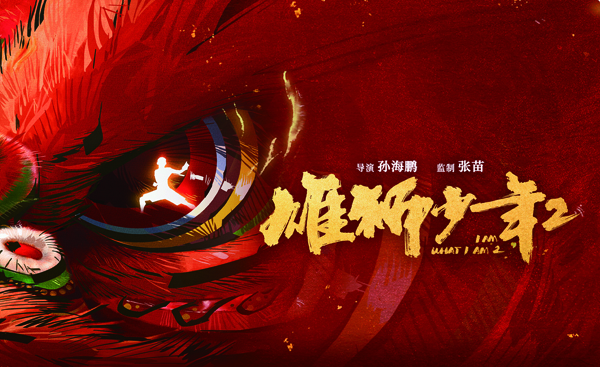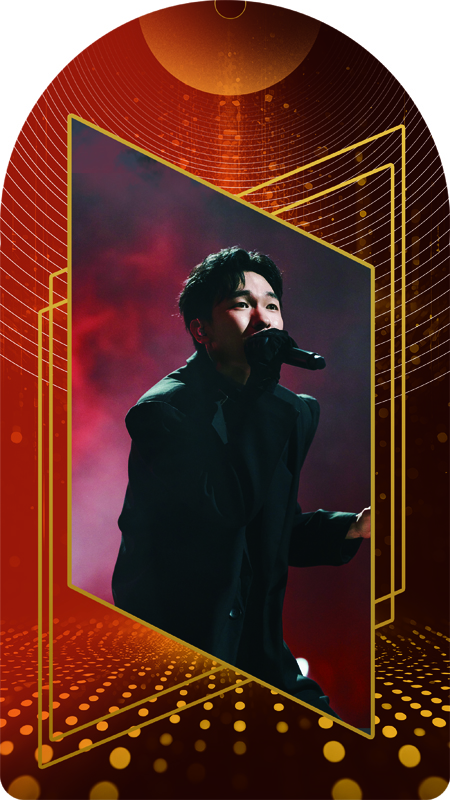
Starting at a young age, a Gen Z rapper is making inroads into the global rap scene.
"Drums of gold resound far and wide, the red lion awakens, breaking new ground. With high spirits, he strides the skies, the youth dances forward without looking back." When 21-year-old rapper Cas14 penned these lyrics, he knew the song was complete.
Cas14, whose real name is Zhang Fenghe, is from Haikou in Hainan province. He was invited to create the ending theme for I Am What I Am 2, the animated film directed by Sun Haipeng and produced by Zhang Miao, which was released on Dec 14 across the Chinese mainland.
Zhang Fenghe named the song Shaonianqiang in Chinese, which translates to "youth power", perfectly capturing the spirit of the film and the qualities of its protagonist, A Juan.
I Am What I Am 2 continues the story of this rural boy from the first film. Despite winning the lion dance competition, A Juan must leave his hometown and work in a big city to support himself and cover his father's medical expenses. In Shanghai, he faces a series of setbacks before an unexpected opportunity arises: he is chosen to represent a declining traditional Chinese martial arts club in a competition. To succeed, he must overcome rivals, prejudices, injustices, and his own fears.
ALSO READ: Chinese rap musicians blend beats across borders
Recognizing the importance of traditional cultural elements in the movie, Zhang Fenghe decided to write the rap lyrics in a style inspired by ancient Chinese poetry, giving the piece a unique "sense of power".
"In middle and high school, I used to discuss classical literature with my dad at home," he said. "I had thought about writing songs in this style before but never had the chance. This time, I decided to give it a try."
He believes the greatest appeal of Chinese rap, compared to Western rap, lies in the unique atmosphere the Chinese language brings to the lyrics.
"China has a more moderate and reserved culture. Chinese expressions are not as open or direct as those in many Western songs, but they have their own charm," he said. "Foreign artists often write about what they do and think, but with Chinese, you can write lyrics that convey a subtle and beautiful feeling, like Jay Chou's songs and Vincent Fang's lyrics."
I Am What I Am 2 marks Zhang Fenghe's first experience creating music for a film, and he finds it quite different from his usual songwriting.
He explained that regular songwriting is a form of self-expression, while film songs require him to immerse himself in the characters and carefully consider and feel their emotions.

Although Zhang Fenghe is young, he has been passionate about rap from an early age.
In primary school, his parents didn't allow him to use a smartphone, so he relied on an old-fashioned phone to download and listen to music. This limitation inadvertently led him to discover rap.
In 2019, Zhang Fenghe participated in "8 Mile Underground", a rap competition, for the first time. He made it to the top four in the Guangzhou division, earning recognition for his talent.
Encouraged by this success, he founded a student rap club at his high school, where he discovered that many of his peers shared his interest in and knowledge of rap.
"Rap is indeed very popular among young people," he said. "At the time, more than 60 students applied to join our club, and we ended up recruiting over 20. Every day, we would bring a speaker and microphone to the area next to the basketball court and rap."
READ MORE: Rap group sings praises of Wuhan
Zhang Fenghe recalled that for a long time, "technical rap" was held in high regard. Compared to lyrical content and musicality, this type of rap prioritizes complex rhythms, tempo changes, fast rapping, and advanced flow techniques.
"When I first started listening to rap, I was drawn to Eminem (the US rapper known for his technical expertise). Naturally, I gravitated toward creating technical, fast-paced rap at the beginning," he said.
"But in recent years, rap has been gradually simplifying. The technical aspects are fading, with rappers focusing more on the vibe and the emotions conveyed to the audience. Listeners now care more about the overall sound and whether the music feels good," he added.
Zhang Fenghe also finds inspiration in emerging styles, such as rage rap — a genre characterized by aggressive and avant-garde elements. This style often expresses anger and chaos through intense rhythms and layered sounds, reflecting the raw energy of its creators.
He highlighted Playboi Carti, a Gen Z pioneer in this field, as a key influence. He was particularly impressed by Carti's innovative use of his voice as an instrument that complements the music rather than dominating it.
For Zhang Fenghe, this boldness and willingness to experiment and innovate are the defining characteristics of the younger generation of rappers.
"Around 2017, everyone seemed to take pride in their technical skills. But the younger artists who emerged later didn't care much about their technical prowess; instead, they embraced the mindset of 'I'm playing with something new and trendy,'" he said.
What Zhang Fenghe is trying to do now is incorporate the Chinese language and cultural concepts into the world's latest and most cutting-edge music styles.
"This may not yet be considered a complete innovation because I don't yet have the ability to create an entirely new realm. But pioneering a new field is the dream of every musician," he said.


